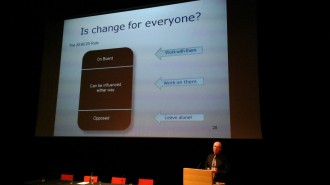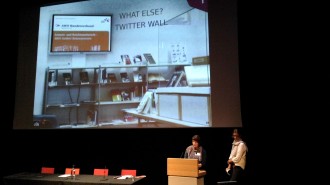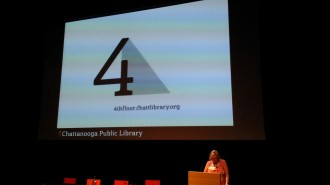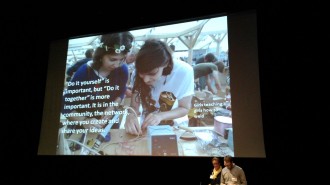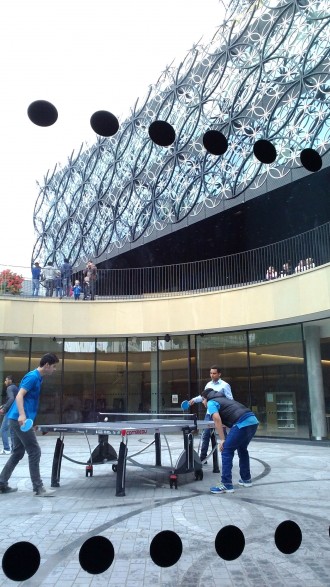Report From the IFLA Public Libraries Conference
Brian Gambles
From August 12-13, 2014, the IFLA Public Libraries Section held a satellite conference, Public Library Futures in a Global Digital World, at the new Library of Birmingham, England. Its director, Brian Gambles, opened the conference with a keynote speech about change. “Leadership has to be hungry for change,” he stated. Small steps were made: a redesigned organization, a new dress code, shared desk space and welfare facilities, as well as new working practices. But change is not embraced by the whole organization: according to the 20:60:20 rule, 20% of staff agrees, another 20% is against. For Gambles, this last minority has to be left alone and “invited to exit the organization.”
The conference confirmed that these are the days of a “renaissance of space.” Here are four experiences of new spaces built by incredible staff and successful branding.
Vera Binz and Sarah Dudek presenting the “Themenraum”
Themenraum
If you had an empty room in your library, how would you use it? 3D printers? The latest high-tech gear? Games? No way! Imagine a book display on a specific topic and let it explode in different dimensions. At the “Themenraum,” or “topic room,” at the Zentral- und Landesbibliothek (Berlin, Germany), web links are next to print bibliographies, while printed books sit next to a Twitter wall and news items. The topics, often inspired by the latest news or important anniversaries, change every month. The patrons’ favorite ones so far have been the Leipzig Bookfair, fairytales, the diversity of Islam, and “poor and rich.” The Themenraum shows how digital curating has emerged as a new skill required by librarians, as well as the public’s need for digital literacy.
Corinne Hill presenting the 4th Floor
4th Floor
“Transformation” is one of the main values of the Chattanooga (Tenn.) Public Library’s mission. The 4th Floor is a space in continuous transformation, thanks to a high performance staff. Before a chaotic repository of unused materials, now the 4th Floor hosts programs and events about coding, genealogy, STEM, and makers. Print collections are still relevant though: “responsive collections” is another strong value of theirs.
Henriette Dybdal and Allan Thomsen Volhoj presenting the FolkeLab
FolkeLab
Public and academic libraries in Aarhus and Roskilde (Denmark) created a project with six temporary innovation spaces, such as TechLab, Wastelab, or GuitarLab. The lessons learned can be summed up in a decalogue: (1) people are not reduced to just guests; (2) people are more important than technology; (3) people have opportunities to engage at different levels; (4) people determine the clout of the maker culture; (5) people create together; (6) staff must be willing to change the frames and expand the ideas; (7) staff uses its own creativity and skills; (8) staff must assure different thresholds; (9) learning is something also done with the hands; (10) creativity comes from chaos and mess.
BiblioTech
BiblioTech in San Antonio (Tex.) went far beyond the library as a book repository, eliminating books completely. Despite being a recent pilot experience, BiblioTech enjoyed terrific global press coverage as the first “bookless library” [1]. The advancement of digital literacy, intended as something more than knowing how to use technology, is one of the main goals. The equipment includes 600 e-readers for external circulation, 45 iPads for internal use, and four surface tables. The library’s success is based on its programming (for seniors too), community partnerships (i.e. with the San Antonio Spurs Foundation), and an attractive brand.
Jens Thorhauge, the guru of the 4-space model, ideally closed the conference describing how the traditional role of public libraries has been challenged during the last 20 years. His provocative assertion that “access to information is not the librarian’s business anymore” hit the mark, considering it preceded by just a few days the launch of the Lyon Declaration on access to information and development.[2]. Thorhauge highlighted that nowadays libraries struggle to compete with fast-movers in the media market (i.e. Facebook), and with commercial media streaming services (Netflix or Spotify). He can’t see a new standard model for libraries though, so the discussion continues.
Table tennis at the Library of Birmingham
References
[1] BiblioTech – An Entirely Bookless Library, by Elena Rivera on February 21, 2013. BiblioTech opened in September 2013. Two satellite facilities were opened more recently.
[2] The declaration will be one of the main advocacy tools for IFLA in the next months.
Tags: bookless libraries, Conferences, continuing education, IFLA, library facilities, library innovation

